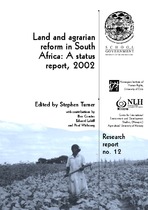| dc.contributor.author | Turner, Stephen | |
| dc.contributor.author | Cousins, Ben | |
| dc.contributor.author | Lahiff, Edward | |
| dc.contributor.author | Wisbourg, Poul | |
| dc.date.accessioned | 2019-03-06T12:33:38Z | |
| dc.date.available | 2019-03-06T12:33:38Z | |
| dc.date.issued | 2002 | |
| dc.identifier.citation | Turner, S. et al. (2002). Land and agrarian reform in South Africa: A status report, 2002. Research Report 12. Institute for Poverty, Land and Agrarian Studies, University of the Western Cape | en_US |
| dc.identifier.uri | http://hdl.handle.net/10566/4362 | |
| dc.description.abstract | In 1994, South Africa started a new life as a democratic nation. It
faced immense challenges. Multiple economic, social and political
transformations were needed to overcome the legacy of colonialism and
apartheid. The racially-driven history of the prosperous South African
economy had marginalised the black majority from access to resources and
productive opportunities, and deprived most of them of the right to
build secure homes and livelihoods in the urban areas where the nation s
wealth was concentrated. | en_US |
| dc.language.iso | en | en_US |
| dc.publisher | Institute for Poverty, Land and Agrarian Studies, University of the Western Cape | en_US |
| dc.relation.ispartofseries | Research Report;11 | |
| dc.subject | Land | en_US |
| dc.subject | Agrarian | en_US |
| dc.subject | Development studies | en_US |
| dc.subject | Sustainable development | en_US |
| dc.subject | World Summit | en_US |
| dc.title | Land and agrarian reform in South Africa: A status report, 2002 | en_US |
| dc.type | Other | en_US |

